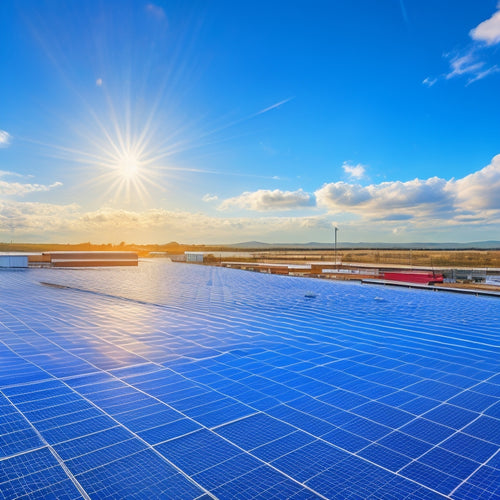
Home Solar Backup Battery
Share
You're considering a home solar backup battery to guarantee a reliable power supply during outages, and that's a smart move. A backup battery stores excess energy from your solar panels, allowing you to access power when the grid fails. Look for a battery with high round-trip efficiency to minimize energy loss, and consider the capacity you need based on your daily energy usage. A deep cycle battery with a high cycle life will provide reliable performance for years to come. As you investigate your options, you'll want to assess your energy needs and identify the essential appliances that need prioritization - and that's just the beginning.
The Essentials
- A home solar backup battery provides reliable power during outages, ensuring essential appliances and lights remain operational.
- Energy storage capacity, measured in watt-hours (Wh), impacts power availability during outages and promotes sustainable living.
- Advanced battery management systems optimize energy usage, minimize waste, and enhance self-sufficiency through smart energy management features.
- Battery cycle life, measured in charge/discharge cycles, affects overall performance and reliability, with longer cycle life reducing replacement frequency.
- Accurate assessment of daily energy usage is crucial for proper battery sizing, ensuring essential appliances receive power priority during outages.
Reliable Power During Outages
You need a reliable source of power when the grid goes down, and a home solar backup battery provides exactly that.
With a battery-based energy storage solution, you can store excess energy generated by your solar panels during the day for use during outages or at night.
This means you'll have power when you need it most, keeping your essential appliances running smoothly.
Power When You Need
When the grid goes down, a home solar backup battery guarantees that your essential appliances and lights stay on, providing reliable power during outages.
You'll have the freedom to keep your life running smoothly, even when the utility grid fails. With a home solar backup battery, you'll enjoy uninterrupted power to your critical loads, such as refrigeration, lighting, and communication devices.
This is made possible through seamless solar panel integration, which guarantees a continuous flow of energy to your home. By providing an immediate and reliable source of power during outages, a home solar backup battery protects your sensitive equipment from damage caused by sudden shutdowns Emergency Power Backup Systems.
Your home energy management system will automatically detect an outage and switch to backup power. This instantaneous response guarantees that you won't experience any disruptions to your daily routine.
You'll have the peace of mind knowing that your home is protected from the uncertainties of grid outages. By providing power when you need it most, a home solar backup battery enables you to take control of your energy independence.
With reliable backup power, you'll be prepared for any situation, giving you the freedom to live life on your own terms.
Energy Storage Solutions
A home solar backup battery serves as a reliable energy storage solution, providing a safeguard against grid outages. With the ability to store excess energy generated by your solar panels, you can enjoy uninterrupted power during outages, ensuring your home remains comfortable and safe. This technology enables you to utilize renewable resources, reducing your reliance on the grid and promoting energy independence.
| Benefits | Features | Advantages |
|---|---|---|
| Energy Independence | Grid Resilience | Reduced Outage Downtime |
| Sustainable Living | Clean Energy | Lower Environmental Impact |
| Energy Conservation | Battery Efficiency | Cost Savings |
Zero Energy Waste
You can optimize your home solar backup battery system to minimize energy waste by ensuring efficient energy storage.
This means choosing a battery with a high round-trip efficiency, which measures how much energy is lost during charging and discharging cycles.
For instance, Lithium-ion batteries are known for their high efficiency and long lifespan, making them a popular choice for solar storage systems.
Additionally, some solar battery storage systems, such as the Tesla Powerwall, offer advanced features like smart energy management to further reduce energy waste.
Efficient Energy Storage
As the solar power system generates electricity, efficient energy storage becomes essential to minimize energy waste and maximize self-sufficiency. You'll want to guarantee that your energy storage system is optimized for peak performance and minimal energy loss.
| Energy Storage Solution | Solar Efficiency | Battery Integration |
|---|---|---|
| Lead-Acid Batteries | 80% | Basic |
| Lithium-Ion Batteries | 95% | Advanced |
| Flow Batteries | 85% | Intermediate |
| Sodium-Ion Batteries | 90% | Advanced |
| Capacitor-Based Systems | 98% | Customized |
When selecting an energy storage solution, consider factors like solar efficiency, battery integration, and overall system compatibility. A well-designed energy storage system can remarkably reduce energy waste and increase your self-sufficiency. By integrating an efficient energy storage system, you'll be able to store excess energy generated by your solar power system during the day and use it to power your home at night or during outages. This will maximize your energy independence and reduce your reliance on the grid.
Zero Grid Dependence
Optimizing energy storage enables homeowners to minimize energy waste and maximize self-sufficiency.
With a well-designed solar backup battery system, you can achieve zero grid dependence, guaranteeing that you're not throwing away excess energy generated by your solar panels. This means you'll be able to store excess energy for later use, reducing your reliance on the grid and minimizing energy waste.
By having a reliable power storage system, you can guarantee continuous power supply for vital systems like medical equipment and security systems Renewable Energy Systems, making it an essential solution for households with specific needs.
To achieve true solar independence, regular battery maintenance is essential. This includes monitoring your battery's state of charge, depth of discharge, and overall health.
Deep Cycle Battery Technology
When selecting a deep cycle battery for your home solar backup system, you'll want to take into account two vital factors: battery cycle life and energy storage capacity.
These parameters will greatly affect your system's overall performance and reliability. As you investigate residential solar power solutions, it's important to understand the role of deep cycle batteries in providing off-grid power backup.
Battery Cycle Life
You're likely wondering how many charge/discharge cycles your home solar backup battery can handle before its capacity starts to degrade. This is a critical aspect of deep cycle battery technology, as it directly impacts the overall lifespan of your energy storage system.
The battery cycle life refers to the number of times a battery can be charged and discharged before its capacity falls below 80% of its initial rating. A longer cycle life means your battery will last longer, requiring less frequent replacements and reducing waste.
To optimize battery lifespan, proper maintenance is vital. This includes regular inspections, keeping the battery at room temperature, and avoiding deep discharges.
Lifespan optimization is also dependent on the battery's chemistry and design. Look for batteries with a high cycle rating, typically measured in the thousands.
Additionally, some manufacturers offer advanced battery management systems that help regulate charging and discharging, further extending the battery's lifespan.
Energy Storage Capacity
As you consider the overall performance of your home solar backup battery, it's vital to understand its energy storage capacity, which directly impacts the amount of power it can provide during an outage or grid failure.
This capacity is measured in watt-hours (Wh) and determines how long your backup system can supply power to your home. A higher energy storage capacity means you'll have more power available during an extended outage.
When selecting a home solar backup battery, you should consider your energy needs and the size of your solar panel array. A battery with a higher storage capacity will allow you to store more excess energy generated by your solar panels during the day, providing a reliable source of power at night or during an outage.
Effective battery management is vital to guarantee the longevity of your battery and optimize its performance. Look for a battery with advanced battery management systems that can monitor and control charging and discharging, as well as integrate seamlessly with your solar panel integration.
Assess Your Energy Demands
You need to determine your daily energy usage to size your home solar backup battery correctly. This involves calculating the total watt-hours your essential appliances require to function during a power outage.
Consider investing in renewable energy systems to further optimize your energy storage solution. By doing so, you'll be able to store excess energy generated by your solar panels for later use.
Daily Energy Usage
To accurately size a home solar backup battery, it's vital to understand your daily energy usage patterns. This involves monitoring your energy consumption to identify peak hours, overall usage, and consumption patterns. By doing so, you'll be able to determine the required capacity of your solar backup battery.
You can use energy monitoring tools, such as smart meters or submeters, to track your energy usage. These devices provide real-time data on your energy consumption, helping you identify areas where you can optimize your energy usage. You can also analyze your past utility bills to understand your energy consumption patterns.
Understanding your daily energy usage patterns is critical to guarantee your solar backup battery can meet your energy demands during a power outage. By accurately sizing your battery, you'll be able to enjoy uninterrupted power supply and achieve energy independence.
It's important to take into account your daily energy usage when designing your solar backup system to guarantee it meets your energy needs and provides the freedom you desire.
Essential Appliance Priority
Frequently, homeowners prioritize essential appliances to guarantee they remain operational during a power outage, and this vital evaluation helps determine the required capacity of your solar backup battery.
You need to identify which appliances you can't live without, such as refrigeration, medical equipment, and lighting. By doing so, you'll be able to allocate your solar backup battery's power accordingly, making sure these vital appliances receive the necessary energy.
This process is called power prioritization, and it's important to confirm you're not oversizing or undersizing your solar backup battery.
When evaluating your essential appliances, consider their power requirements, usage patterns, and appliance compatibility. This information will help you determine the minimum capacity required to support your vital loads.
For instance, if you have a medical refrigerator that consumes 500 watts, you'll need to verify your solar backup battery can provide at least that amount of power during an outage.
Advanced Lithium-Ion Chemistry
You're likely familiar with lithium-ion batteries, but advanced lithium-ion chemistry takes energy storage to the next level.
By optimizing the battery's internal design and materials, manufacturers can considerably enhance its cycle life, allowing it to charge and discharge more efficiently over its lifespan.
This means you can expect a longer-lasting battery that requires less maintenance and replacement.
Enhanced Cycle Life
With advanced lithium-ion chemistry, your home solar backup battery benefits from enhanced cycle life, thanks to the improved cell design and carefully selected materials that minimize degradation over time. This means you'll enjoy a longer lifespan for your battery, reducing the need for frequent battery maintenance and replacement.
Lifespan enhancement is achieved through advanced performance monitoring, which tracks charging cycles, temperature effects, and discharge rates to verify your battery operates within ideal parameters. This monitoring also enables you to adjust your usage patterns to maximize efficiency, further extending the life of your battery.
When the time comes to replace your battery, you'll appreciate the convenient recycling options available, which not only reduce waste but also help minimize the environmental impact of your energy storage solution.
Additionally, warranty considerations are built into the design, providing you with added peace of mind and protection for your investment. With efficiency testing and certification, you can trust that your home solar backup battery will deliver reliable performance and freedom from the grid for years to come.
Frequently Asked Questions
Can I Use My Solar Backup Battery for RVS or Boats?
You can use your solar backup battery for RV power or boat energy, but first, confirm battery compatibility and check the solar portability features, like size and weight, to assure a seamless off-grid experience on the open road or water.
Are Home Solar Backup Batteries Eligible for Government Incentives?
Did you know 30% of solar installations are eligible for incentives? You can tap into these benefits too! As a homeowner, you're likely eligible for government incentive programs, such as tax credits, to offset the cost of your solar backup battery.
How Often Should I Maintain My Solar Backup Battery System?
To maximize your investment, you should perform regular maintenance to extend battery lifespan; follow these maintenance tips: inspect connections monthly, update software quarterly, and conduct annual deep-cycle tests to guarantee peak performance and freedom from energy worries.
Can I Add More Batteries to My Existing Solar Backup System?
Coincidentally, you're wondering if you can expand your existing system. Yes, you can add more batteries, but verify compatibility by checking voltage, capacity, and chemistry. Also, review your expansion system requirements to confirm seamless integration and ideal performance.
Will a Solar Backup Battery Work During a Grid Tie Inverter Failure?
When a grid-tie inverter fails, you'll still have power security through grid independence, as your solar backup system can isolate from the grid and continue supplying electricity, ensuring your essential appliances remain operational.
Final Thoughts
As you weigh your options for a home solar backup battery, remember that an ounce of prevention is worth a pound of cure. With reliable power during outages, zero energy waste, and advanced lithium-ion chemistry, you'll be well-prepared for any situation. By evaluating your energy demands and choosing a deep cycle battery, you'll guarantee your home remains powered and comfortable when the grid fails. Don't wait until it's too late - invest in a home solar backup battery and take control of your energy independence.
Related Posts
-

Is Switching to Green Energy Solutions Easy
Switching to green energy solutions isn't just easy; it's also beneficial. You can greatly cut utility costs and enjo...
-

Solar Powered Lights for Sustainable Home Decor
Solar-powered lights offer a stylish and eco-friendly way to enhance your home decor. They capture sunlight, converti...
-

Commercial Solar Energy
As you consider powering your business with commercial solar energy, you'll uncover it offers a triple benefit: signi...


